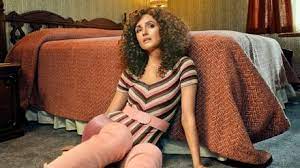For Rose Byrne, this has been a bumpy ride through feminist history.
She was Gloria Steinem, glowing with 1970s confidence. Now (shown here) she’s the fictional Sheila Rubin, temporarily staggered by ‘80s self-doubt.
First was the “Mrs. America” mini-series, with Byrne drawing praise (and award nominations) as Steinem. Now Apple TV+ has “Physical,” with three episodes Friday and the other seven weekly.
“In a funny way, ‘Physical’ felt like such a great companion piece,” Byrne said. Her character “definitely has come up through the ‘60s and ‘70s, so she’s sort of a child of that movement.”
She lives in the California sunshine, where her husband is a professor/politician who says hip things about coastal culture and the environment. Still, she’s riddled with doubts about herself, including her looks and her weight.
That’s what makes the casting seem either inspired or perverse: Byrne, 41, is sleek and beautiful; yet here she is, playing someone who frets about her look and her weight.
“There is no rule of who does or doesn’t feel like this or has personal demons – no matter who you are or what you look like,” Byrne said.
Annie Weisman, the “Physical” creator, agreed. “The divide between the external and the internal for so many women” can be huge, she said. “No matter how polished and perfect the external gets, there’s a tremendous amount of turmoil under the surface …. It’s not about what you see in the mirror; it’s about what you’ve absorbed from the culture.”
Besides, she has a trick – hinted at in the title and the opening flashforward: Through some offbeat twists in the early episodes, Sheila turns her insecurities into a place in the ‘80s workout-video surge.
This very American story is led by two Australians – Byrne, 41, and producer/director Craig Gillespie, 53, best-known for the dark humor of “I, Tonya.” But it was created by Weisman; she’s been a writer/producer on other people’s shows (“Desperate Housewives,” “About a Boy,” etc.) but calls this a personal piece, with characters she’s familiar with.
“I grew up in a family of San Diego surfing Jews,” she said, “and I was excited to show a little bit of a different side to the culture … away from some of the more East Coast or New York stereotypes.”
Danny is Jewish, Sheila isn’t. Both embrace liberal politics and California culture.
For Sheila, that last part eventually leads to being onstage in tight, flashy costumes. “Those leotards are just within an inch of” your life, Byrne said. “It’s like a Marvel costume.”
Still, she found those scenes to be less intimidating than most, because there was no chance to fret. “It gets you out of your head, because I’m so focused on trying to do the moves or the choreography …. It’s actually quite liberating, weirdly.”
Liberation can be a complex thing. A real-life feminist (Jane Fonda) propelled the video-aerobics movement. And a fictional one (Sheila) uses it as a path toward power and control.
